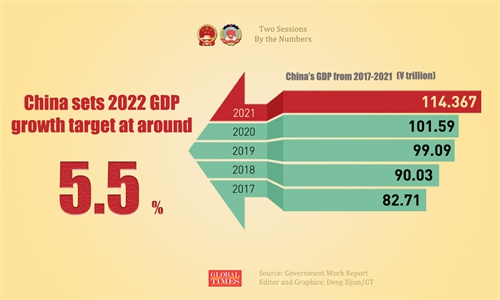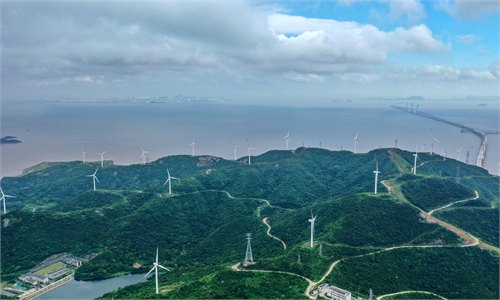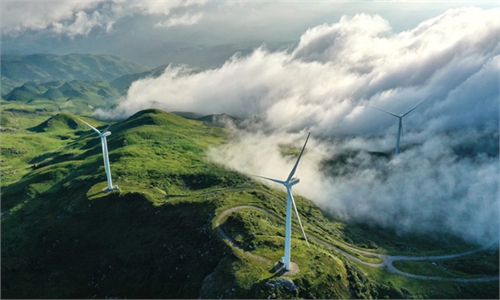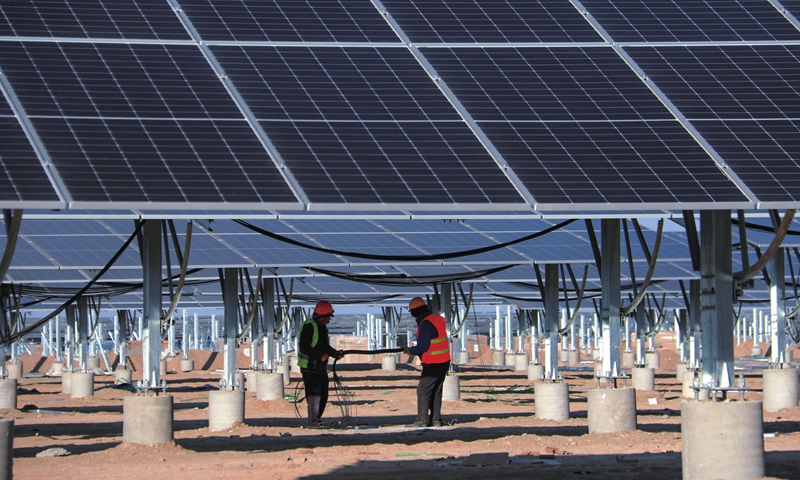
Workers help build a 40-megawatt solar power project in a photoelectric industrial park in Dunhuang, Northwest China's Gansu Province on December 11, 2021. The city has over recent years taken advantage of its bountiful wind and solar resources to push for the development of the local new energy sector, beefing up its green economy. Photo: cnsphoto
China will take a series of actions ranging from increasing energy reserves to expanding grain production to secure stable food and energy supplies, as part of the country's top priority to ensure economic stability and people's livelihood amid growing global uncertainties, Chinese officials said on Monday.
At the ongoing two sessions in Beijing, top officials have also stressed the importance of ensuring energy and food security.
When visiting national political advisors from the sectors of agriculture and welfare and social security on Sunday, President Xi Jinping emphasized the importance of "filling the rice bowl of Chinese people mainly with Chinese grain," stressing that it's wrong to think that food supply is no longer a problem in an industrialized society, or to count on the global market to solve the issue, the Xinhua News Agency reported.
At a press conference on Monday, officials reiterated the country's determination to safeguard grain security. Hu Zucai, an official with the National Development and Reform Commission (NDRC), the top economic planner, said that China will ensure stable production of grains like wheat and rice. The government will also launch projects to enhance the production of soybeans and oil, Hu said.
Officials also vowed measures to ensure stable energy supplies. For example, China is prepared to take action to increase energy supplies, including pushing forward the construction of large wind power and photovoltaic bases in desert areas and increasing the country's coal reserves to more than 200 million tons.
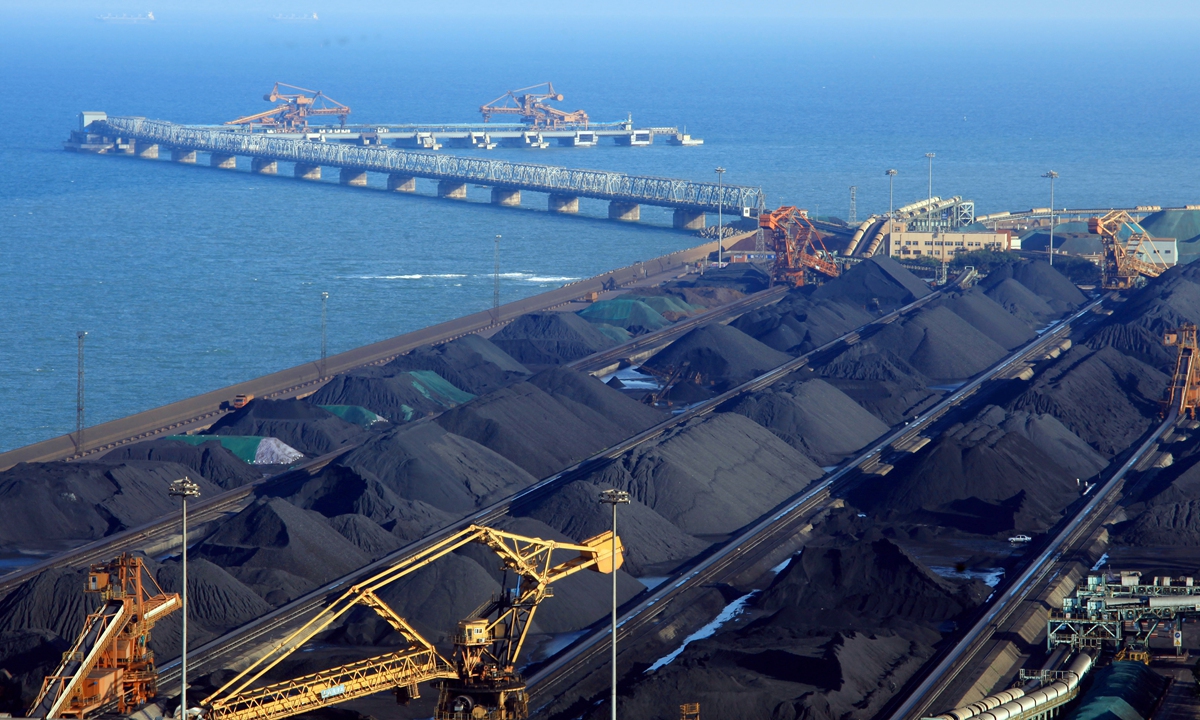
View of piles of coal on a quay in Rizhao, East China's Shandong Province Photo: cnsphoto
The emphasis on securing bulk commodity supplies comes as commodity prices and supplies face rising pressure from geopolitical tensions - namely, the Russia-Ukraine conflict, which could send global commodity prices soaring, experts said.
"A prominent problem this year is that Russia-Ukraine tensions will bring uncertainties to the international agricultural market, as those two countries play important roles in the global trade of wheat and corn," Li Guoxiang, a research fellow at the Chinese Academy of Social Sciences, told the Global Times on Sunday.
Li said it's unlikely that there will be big problems with supplies of those grains in China, but a price rise in the international market might spill over to China, causing ripple effects in agriculture and related industries.
The same goes for energy, as Russia is a major global energy supplier, experts noted, as energy prices have already begun to jump amid the tensions.
Lian Weiliang, deputy head of the NDRC, said on Monday that the escalated conflict between Russia and Ukraine will impact the global energy market and China, as a major crude and natural gas importer, will also see some impact, but the impact is "controllable" in general given various factors such as China's diverse sources of energy supplies.
For China, stabilizing commodity supplies and prices is an essential prerequisite for achieving stable growth, as higher prices would depress all three pillars of the economy - consumption, investment and trade - which will pose difficulties for China to achieve its growth target of around 5.5 percent this year, experts said.
"Higher commodity prices will lead to higher prices for end-use products and consumer goods, reducing the propensity to consume. It will also lead to an increase in costs for manufacturers, which will hurt investment and trade as well," Hu Qimu, chief research fellow at the Sinosteel Economic Research Institute, told the Global Times.
This year's government work report, which was submitted to the National People's Congress, the top legislature, for deliberation, stressed that economic stability must be made top priority in the government's work in 2022 and progress must be pursued while ensuring stability.
At the press conference on Monday, NDRC officials also stressed stability, while expressing confidence that China can cope with external challenges and ensure stability.
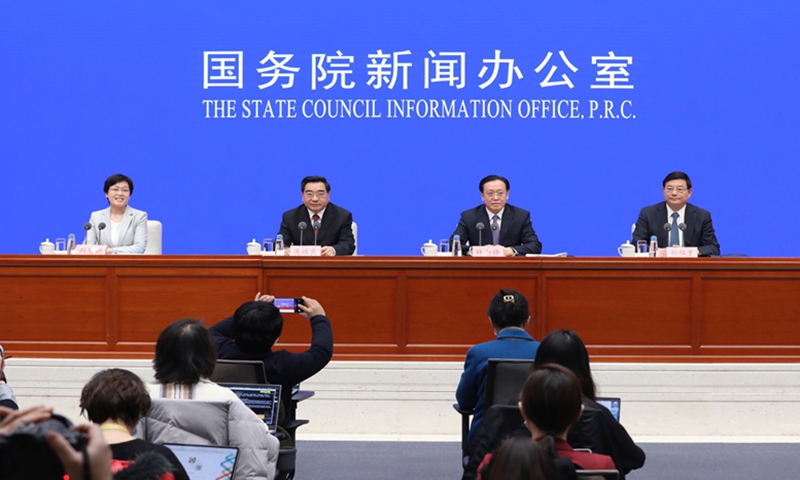
The National Development and Reform Commission held a press conference on March 7, 2022 in Beijing on China's achievements during the high-quality development. Photo: VCG
"Although the external environment is turning more complicated and severe, China still has a good foundation and conditions to keep its economy running within a reasonable range," Lian said.Hu said that the around 5.5-percent growth target is close to China's long-term potential growth rate, and China should be able to achieve the target, as input in infrastructure construction will help drive up investment.

